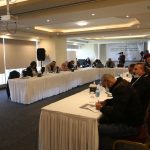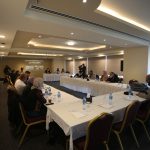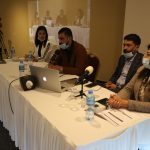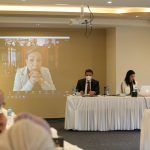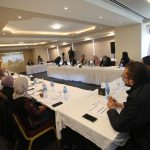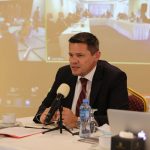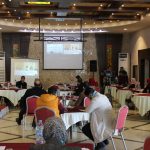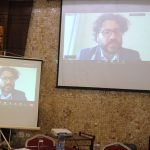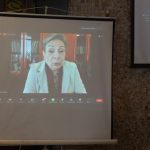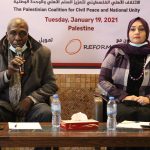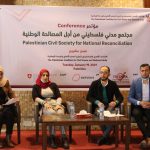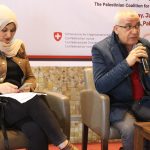A conference entitled “Civil Society for National Reconciliation” was organized on Tuesday by Pal-Think for Strategic Studies and in collaboration with REFORM in partnership with “The Palestinian Coalition for Civil Peace and National Unity” and with funding from the Swiss Government.
The conference was with the attendance of the Head of the Swiss Representative Office in the OPT., Viktor Favrica, Chairman of the Board of Directors of the Palestinian Initiative for Deepening Global Dialogue and Democracy, “MOFTAH”, Dr Hanan Ashrawi, with the participation of several civil action organizations from the West Bank and the Gaza Strip, via video conference technology.
Besides, several representatives of consulates, embassies and international institutions also participated through the Zoom. This conference is part of the project “The Palestinian Coalition for Civil Peace and National Unity” which announced the launch of a coalition of 49 civil society institutions in all Palestinian governorates and aims to unite efforts towards contributing to national unity.
The first session was moderated by the Director of Programmes of the Swiss Representation in the Palestinian Territories, Amani Arori and said that this Conference is part of community reconciliation efforts and aims at the culmination of a range of interventions implemented within the project of a National Coalition for Community Unity and Harmony; to restore the relationship between all parts of society between the West Bank and the Gaza Strip.
She also pointed out that community reconciliation is very important to the Swiss Government. Then she added that this project was able to establish the relationship between grassroots and community institutions, especially youth, to be the beginning of a long-term partnership.
After that, Pal-Think’s director, Mr Omar Shaban, said that this Conference is the conclusion of a project that has been underway for one and a half years and the inauguration of the Palestinian Civil Peace Coalition, which includes some 50 civil institutions from the West Bank, Jerusalem and the Gaza Strip.
He added that Pal Think was the first Palestinian institution to produce a reconciliation paper immediately after the split in August 2007, which served as a reference for dozens of subsequent papers and proposals.
He further stressed that they have partnered with the Swiss Representative in Ramallah since 2007 and together produced a road map and what is known as the Swiss paper that addressed the process of integrating the staff of the Ministries of Health, Education in the Gaza Strip.
Then he noted that they have also promoted dialogue between universities and student councils between the West Bank and the Gaza Strip. Plus, he said that they were the initiator of the Bank-Gaza networking programmes, currently working with 57 Palestinian community institutions.
Shaban continued that they have undertaken many initiatives to promote a culture of non-violence in the face of hate speech, violence and the phenomenon of denial that is growing in Palestine and the Gaza Strip in particular.
Then he emphasized that Pal-Think also provided a dialogue chance for youth deprived of travel abroad and explore other cultures. He further pointed out that they have implemented many projects that promote a culture of dialogue, democracy, women’s freedom and youth culture. And said that they have carried out many workshops that have moved the world into the Gaza Strip, despite that most people in Gaza cannot travel abroad.
He went on by saying that in this optimistic atmosphere, Palestinians are awaiting Palestinian elections in May. More than 1 million Palestinians in the West Bank and Gaza Strip have not practiced the democratic process in their lives.
After that, he stressed that Gaza’s youth suffer from the split, political and intellectual polarization, and conditions for extremism are at odds locally and regionally, owing to lack of political, economic and social opportunities in and out of Gaza. So, they look with hope to the elections to contribute to the building of a nation and to stand for a civilized and tolerant society.
Then he concluded by saying that they in Pal- Think are proud to serve Palestinian people, and they thank the Swiss Government, which has not stopped supporting the Palestinians.
The REFORM’s project coordinator, Ms Rawan AlSharqawi said that this conference has been held to focus on the need for Palestinian reconciliation and what it has left behind at all levels. She added that the Coalition’s idea was to work to reform the social components of the West Bank, Jerusalem and the Gaza Strip, restore trust in civil institutions and create a better reality for young people. Plus, the consolidation of the values of coexistence, solidarity and civil peace.
the Head of the Swiss Representative Office in the OPT., Mr Viktor Favrica, said that on behalf of the Swiss representative in Ramallah, they express their happiness at the launch of the Palestinian National Coalition and are excited to hear what has been achieved despite the challenges faced by civil society organizations, particularly in the context of the Corona pandemic. Then he praised the efforts of Pal-Think and REFORM.
Mr Favrica stressed that Switzerland was one of the first States to support Palestinian reconciliation and the promotion of peace in the region. Then he added that the Palestinian civil society played an important role in bridging the gap between the West Bank and the Gaza Strip.
Mr Viktor concluded by saying that community reconciliation is essential to achieving political and national unity, and they will continue to support Palestinian reconciliation efforts between the West Bank and the Gaza Strip.
During the second meeting, Ms Amani Arori complimented the speakers, with Mr Sami Bahdari of Solidarity Charity Rafah speaking about the youth movements to achieve Palestinian unity. Unfortunately, the law on standing in the Legislative Council was 28 years, not 21, which denied many the right to stand.
In turn, Mrs Faten Harab from the Association of Youth and Environment-Deir al-Balah said that women paid a very high price as a result of the political, economic and social split. She hoped that women would have an active role in decision-making and not its implementation, especially since there were capable and highly qualified women.
Also, Mr Odi Amar of the Association of Human Rights Defenders – Tulkarm said that the Palestinian split has been a major cause of human rights violations in Palestine. Then he stressed that the most important issue is the absence of the Legislative Council. Some decisions passed by the law violate human rights.
In the same context, Ms Iman Abdurrahman of the Community Dialogue Society – Ramallah said that the impact of the split is greater than that of the occupation on the Palestinians, and it is the second Nakba was on the Palestinians. She reviewed her experience of being from the Gaza Strip and living in the West Bank and unable to visit the Strip. There was no role for women in the Palestinian split. She also criticized the 26 per cent female representation decision and demanded 30 per cent.
As for Mr Sami Qatnani of the Arab-Jerusalem Women’s Association said that the Youth and women are the main forces for change in any society and they must support them so that they can play their positive role in change.
Moreover, Dr Alaa Altarter, Programme Adviser, Palestinian Women Politicians Network said that the elections were a facet of the democratic process, not democracy itself, and what matters is the durability of the process, which is the goal of civil society institutions.
He also added that the role of youth and women is to promote accountability, which has been significantly weakened in the recent period. Then he insisted that the question now is, how will the Palestinian Split badly affect the Palestinian elections and their results?
The Secretary-General continued that it was also important to talk about the National Council for fear of any emergency that would prevent Palestinians from renewing the members of the Legislative Council. He also pointed out that the global experiences and policy papers have shown that when women are present in the electoral process, they constitute more positive outcomes.
He concluded by saying that as a civil society, their role is to confront the securitization and authoritarianism that have overwhelmed civil society organizations.
In the same context, the Chairman of MOFTAH, Mrs Hanan Ashrawi said that they must not focus on the cause that they have a State because they have no sovereignty, no control over their land, airspace, sea, freedom of movement and even the Palestinian individual.
During the third session, which was moderated by Mrs Sally Al-Sammak, Pal-Think’s Project Coordinator and Kayed Muiari, from the Witness Centre, she addressed the achievements of the Coalition and Partnership among Institutions as the most important tools for success in achieving the goal of unity and reducing the gap left by the split, and efforts towards business continuity to achieve and disseminate the goal of the Coalition.
The session began with a film featuring different views of various groups of society in all Palestinian governorates on the split and the resulting crises and on the aspirations and recommendations of citizens to end the split.
Then Mr Bilal El Najjar, the coalition coordinator in the Gaza Strip, spoke and said that the idea of a coalition started two years ago by Pal-Think and was then adopted by the Swiss Government.
He also noted that the goal of the coalition was to achieve Palestinian community reconciliation and unity in cooperation with institutions from within and outside Palestine. The Coalition’s institutions had implemented 23 initiatives in both parts of the country, during which more than 200 activities had been carried out.
After that, he added that the Coalition is working on three strategies: contributing to the building and development of the professional capacities of the members of the Rassemblement, lobbying for the achievement of national unity and community reconciliation, and empowering civil society institutions to participate actively in the Palestinian reconciliation rounds.
In turn, the coalition coordinator in the West Bank, Rawan Al Sharqawi, said that the coalition initiatives have highlighted the split and its implications, lobbying through youth to develop real and effective interventions, and strengthening national ties.
She added that Those initiatives have restored some hope to institutions and individuals that community reconciliation can be achieved. Various radio episodes, films and videos were recorded. At least 58 press stories on the activities of the Coalition were published.
Furthermore, Mr Jamil Al – Darbashi of the Palestinian Center for Communication and Development Policy said that they targeted 20 marginalized women’s CBOs. Then he added that they wanted to integrate these institutions into the agenda of community peace and reconciliation and to create a feminist base of these institutions.
In the same context, Mr Yassin Odaa of the Palestinian Working Women’s Association – Gaza indicated that they had established a media youth forum entitled 2250 in collaboration with the Amjad Society for Community Creativity and Development, aimed at enhancing the role of youth in the civil peacemaking. Besides, training them in making content to hire in the development process, as well as in how to create sustainable content.
For its part, Ms Ehsan Awad of the Benian Community Development Association – Khanyouns explained that they had implemented a “Society for All” initiative in partnership with the Future Society in Gaza and Arab women in Jerusalem, which had a significant impact on highlighting the importance of uniting efforts to promote national reconciliation and the need for the media to advocate for reconciliation.
Besides, Mr Murad Al Sabeah from the Foster Foundation for Sustainable Development Goals – Ramallah said that their goal was to create public, influential and effective opinion to put pressure on ending the split by producing four radio episodes via the Foster Foundation podcast.
Mr Raed Al-Dabaei, from Seeds Society for Development and Culture – Nablus spoke of the “Together Fly High” initiative of his foundation, which had launched 50 Palestinian flag kites from 50 young people in the village of Sebastia under threat of occupation. Besides, they had held an online exhibition with the Alumni Girls’ Association, in addition to two workshops that had discussed the issue of youth participation in decision-making.
And back to Pal Think’s director, Mr Omar Shaban, who said at the end of the conference that this project has genuinely challenged the blockade. And stressed that they will continue their work in partnership with the Swiss Government.
He further pointed out that they will develop budgets for partnerships with institutions, and they want to connect young people and their voice to the decision-maker. As well as, they are reducing the age of standing for youth because that is their right.
The Conference concluded by REFORM’s director, Mr Odi Abu Karsh by saying that they will expand this coalition, and increase communication with partner institutions.


